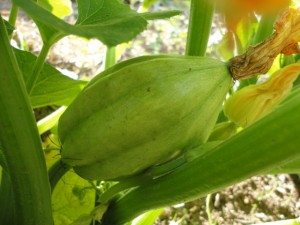

by Samantha Prust
This is the first year that my hubs and I have grown a full-scale garden. We turned our backyard from a place where we watered and mowed grass into a place where we grow our own food. We planted just about everything: beans, corn, squash, melons, broccoli, radishes, onions, scallions, snap peas, zucchini, Swiss chard, garlic, basil, dill, four lettuce varieties, four tomato varieties, four carrot varieties, two beet varieties, two cucumber varieties, two potato varieties, two pumpkin varieties and two watermelon varieties. I also planted marigolds, sweet alyssum and two kinds of sunflowers in and around the garden based on the organic gardening method called companion planting, which recommends planting certain flowers next to certain vegetables to attract beneficial insects or repel or divert harmful pests.
I love the idea of the potager garden: a mixture of vegetables and flowers, utility and beauty. But vegetable plants are also beautiful and flowers are also utilitarian; in the garden, there's no distinction between the two. I'm amazed at how the plants and flowers we stuck in the ground as seed have transformed to full grown plants that will eventually bear luscious gems that you can eat right off the vine or add to your recipes. Being in awe of how plants grow must be something that all beginning gardeners experience, something that you take for granted if you've never tried to grow your own food. Gardening also gives me a chance to be creative, to learn and challenge myself in unfamiliar territory and to get gratification from hard work. Being in the garden clears my mind, gets me out of my head and makes me focus on the here and now. It also has the ability to be meditative and reflective; you never know what you'll find among the foliage—spiders, ladybugs, bees, and epiphanies. This year is only the beginning; I plan to continue my "garden therapy" for years to come.
Here's one of my favorite poems, by Li-Young Lee, that says what I feel about gardening much better than I could.
From Blossoms
From blossoms comes
this brown paper bag of peaches
we bought from the joy
at the bend in the road where we turned
toward signs painted peaches.
From laden boughs, from hands,
from sweet fellowship in the bins,
comes nectar at the roadside, succulent
peaches we devour, dusty skin and all,
comes the familiar dust of summer,
dust we eat.
O, to take what we love inside,
to carry within us an orchard, to eat
not only the skin, but the shade,
not only the sugar, but the days, to hold
the fruit in our hands, adore it, then bite into
the round jubilance of peach.
There are days we live
as if death were nowhere
in the background; from joy
to joy to joy, from wing to wing,
from blossom to blossom to
impossible blossom,
to sweet impossible blossom.



